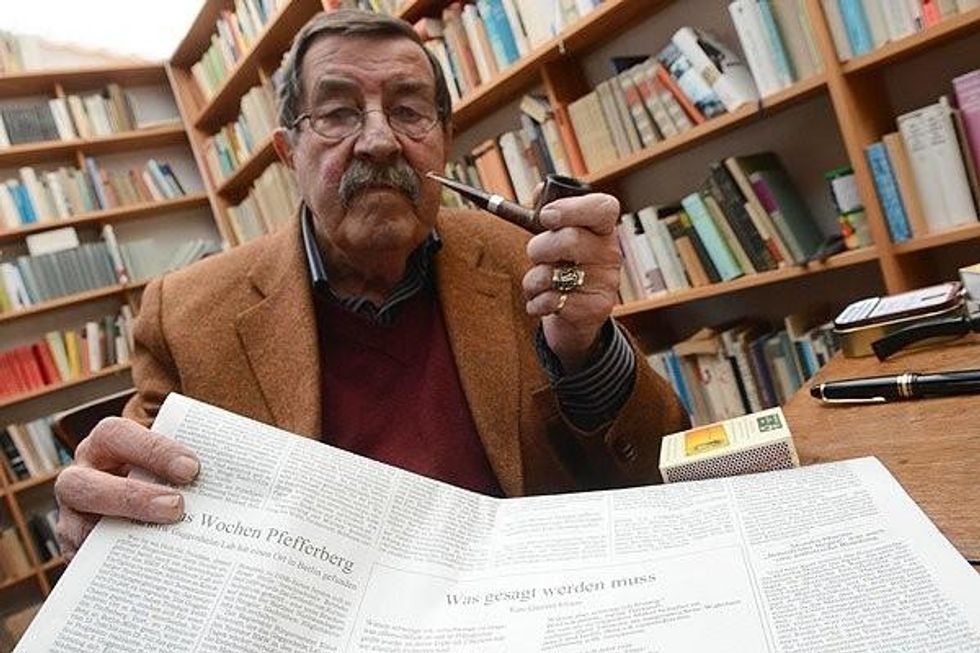In Defense of Gunter Grass
The controversy over Gunter Grass's poem about Israel and Iran only confirms what Grass was saying: That it's impossible to criticize Israel without being lambasted.
The controversy over Gunter Grass's poem about Israel and Iran only confirms what Grass was saying: That it's impossible to criticize Israel without being lambasted.

Grass, the Nobel-Prize-winning author of The Tin Drum, among many other works, dared to question Israel's first strike policy against Iran, dared to underscore "the West's hypocrisy" that permits Israel to have an arsenal of uninspected nuclear weapons and then permits Israel to threaten to annihilate the Iranian people if Iran tries to get one of its own.
For this, Grass has been roundly condemned. The Israeli government has banned him from entering that country, and Benjamin Netanyahu has ridiculed him for essentially espousing views from Grass's Nazi youth.
Grass seemed to anticipate just such a reaction and wrestled with whether to speak out or not.
The first words in his poem, after all, are "Why do I stay silent."
And he answers, in part, because he knows he'll be hit with the familiar "verdict of 'anti-Semitism.' "
And he knows that Germany's responsibility for the Holocaust also has kept him silent:
"Because I thought my origin/Afflicted by a stain never to be expunged" served as a muzzle when it came to criticizing Israel, a country "to which I am bound and wish to stay bound."
As a German, Grass writes that he feels obliged to speak out because Germany is sending Israel another submarine "whose specialty consists of guiding all-destroying warheads." He writes: "We--as Germans burdened enough--could be suppliers to a crime that is foreseeable."
He doesn't make a false equivalence to the Holocaust. In fact, he calls Germany's "own crimes" as being "without comparison."
Nor does Grass hold a brief for Iran's Mahmoud Ahmedinejad-- whom he calls a "loud-mouth" subjugating his people.
But Grass worries that an attack by Israel would be catastrophic and that time is getting short.
And so he writes, "aged and with my last ink," that "the nuclear power Israel endangers/the already fragile world peace."
He urges Israel to "renounce violence" and he calls on an international agency to take control of both the Israeli and the Iranian nuclear sites.
So what exactly has Gunter Grass done wrong here?
What he wrote about "the West's hypocrisy" and the nuclear double standard is true.
What he wrote about the impending risk of an Israeli first strike is also true.
And if you believe in nuclear disarmament, as I do, then his position on having the U.N. take over Israel's and Iran's nuclear sites is also commendable.
Grass's words are not the words of an anti-Semite. They are the words of a man of conscience and a man of peace, daring to speak out even as he knows the slurs are coming.
An Urgent Message From Our Co-Founder
Dear Common Dreams reader, The U.S. is on a fast track to authoritarianism like nothing I've ever seen. Meanwhile, corporate news outlets are utterly capitulating to Trump, twisting their coverage to avoid drawing his ire while lining up to stuff cash in his pockets. That's why I believe that Common Dreams is doing the best and most consequential reporting that we've ever done. Our small but mighty team is a progressive reporting powerhouse, covering the news every day that the corporate media never will. Our mission has always been simple: To inform. To inspire. And to ignite change for the common good. Now here's the key piece that I want all our readers to understand: None of this would be possible without your financial support. That's not just some fundraising cliche. It's the absolute and literal truth. We don't accept corporate advertising and never will. We don't have a paywall because we don't think people should be blocked from critical news based on their ability to pay. Everything we do is funded by the donations of readers like you. Will you donate now to help power the nonprofit, independent reporting of Common Dreams? Thank you for being a vital member of our community. Together, we can keep independent journalism alive when it’s needed most. - Craig Brown, Co-founder |
The controversy over Gunter Grass's poem about Israel and Iran only confirms what Grass was saying: That it's impossible to criticize Israel without being lambasted.

Grass, the Nobel-Prize-winning author of The Tin Drum, among many other works, dared to question Israel's first strike policy against Iran, dared to underscore "the West's hypocrisy" that permits Israel to have an arsenal of uninspected nuclear weapons and then permits Israel to threaten to annihilate the Iranian people if Iran tries to get one of its own.
For this, Grass has been roundly condemned. The Israeli government has banned him from entering that country, and Benjamin Netanyahu has ridiculed him for essentially espousing views from Grass's Nazi youth.
Grass seemed to anticipate just such a reaction and wrestled with whether to speak out or not.
The first words in his poem, after all, are "Why do I stay silent."
And he answers, in part, because he knows he'll be hit with the familiar "verdict of 'anti-Semitism.' "
And he knows that Germany's responsibility for the Holocaust also has kept him silent:
"Because I thought my origin/Afflicted by a stain never to be expunged" served as a muzzle when it came to criticizing Israel, a country "to which I am bound and wish to stay bound."
As a German, Grass writes that he feels obliged to speak out because Germany is sending Israel another submarine "whose specialty consists of guiding all-destroying warheads." He writes: "We--as Germans burdened enough--could be suppliers to a crime that is foreseeable."
He doesn't make a false equivalence to the Holocaust. In fact, he calls Germany's "own crimes" as being "without comparison."
Nor does Grass hold a brief for Iran's Mahmoud Ahmedinejad-- whom he calls a "loud-mouth" subjugating his people.
But Grass worries that an attack by Israel would be catastrophic and that time is getting short.
And so he writes, "aged and with my last ink," that "the nuclear power Israel endangers/the already fragile world peace."
He urges Israel to "renounce violence" and he calls on an international agency to take control of both the Israeli and the Iranian nuclear sites.
So what exactly has Gunter Grass done wrong here?
What he wrote about "the West's hypocrisy" and the nuclear double standard is true.
What he wrote about the impending risk of an Israeli first strike is also true.
And if you believe in nuclear disarmament, as I do, then his position on having the U.N. take over Israel's and Iran's nuclear sites is also commendable.
Grass's words are not the words of an anti-Semite. They are the words of a man of conscience and a man of peace, daring to speak out even as he knows the slurs are coming.
The controversy over Gunter Grass's poem about Israel and Iran only confirms what Grass was saying: That it's impossible to criticize Israel without being lambasted.

Grass, the Nobel-Prize-winning author of The Tin Drum, among many other works, dared to question Israel's first strike policy against Iran, dared to underscore "the West's hypocrisy" that permits Israel to have an arsenal of uninspected nuclear weapons and then permits Israel to threaten to annihilate the Iranian people if Iran tries to get one of its own.
For this, Grass has been roundly condemned. The Israeli government has banned him from entering that country, and Benjamin Netanyahu has ridiculed him for essentially espousing views from Grass's Nazi youth.
Grass seemed to anticipate just such a reaction and wrestled with whether to speak out or not.
The first words in his poem, after all, are "Why do I stay silent."
And he answers, in part, because he knows he'll be hit with the familiar "verdict of 'anti-Semitism.' "
And he knows that Germany's responsibility for the Holocaust also has kept him silent:
"Because I thought my origin/Afflicted by a stain never to be expunged" served as a muzzle when it came to criticizing Israel, a country "to which I am bound and wish to stay bound."
As a German, Grass writes that he feels obliged to speak out because Germany is sending Israel another submarine "whose specialty consists of guiding all-destroying warheads." He writes: "We--as Germans burdened enough--could be suppliers to a crime that is foreseeable."
He doesn't make a false equivalence to the Holocaust. In fact, he calls Germany's "own crimes" as being "without comparison."
Nor does Grass hold a brief for Iran's Mahmoud Ahmedinejad-- whom he calls a "loud-mouth" subjugating his people.
But Grass worries that an attack by Israel would be catastrophic and that time is getting short.
And so he writes, "aged and with my last ink," that "the nuclear power Israel endangers/the already fragile world peace."
He urges Israel to "renounce violence" and he calls on an international agency to take control of both the Israeli and the Iranian nuclear sites.
So what exactly has Gunter Grass done wrong here?
What he wrote about "the West's hypocrisy" and the nuclear double standard is true.
What he wrote about the impending risk of an Israeli first strike is also true.
And if you believe in nuclear disarmament, as I do, then his position on having the U.N. take over Israel's and Iran's nuclear sites is also commendable.
Grass's words are not the words of an anti-Semite. They are the words of a man of conscience and a man of peace, daring to speak out even as he knows the slurs are coming.

